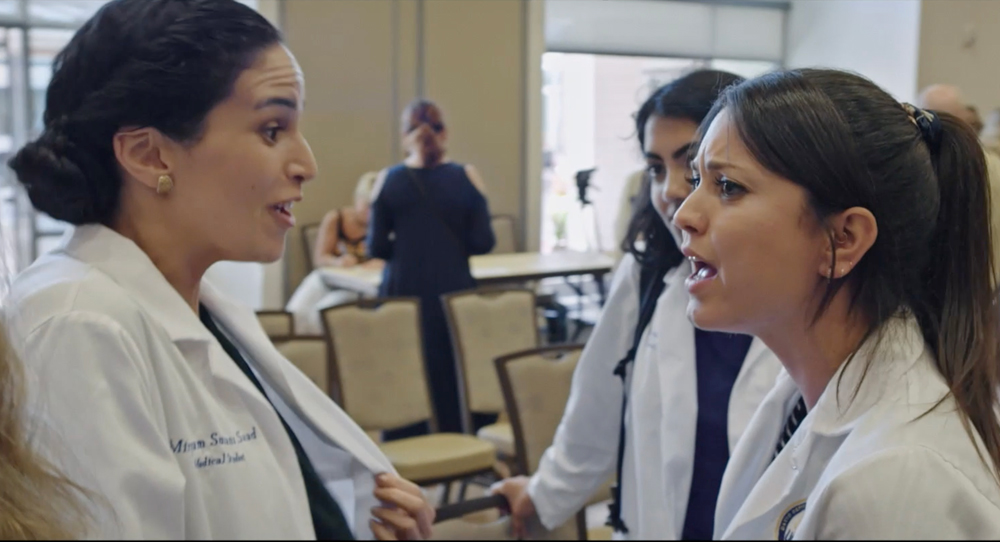“I wish I could focus on medicine, but I always focus on my advocacy work,” says Neda Ashtari, a medical student at UCLA who in “White Coat Rebels,” laments the time she’s spending away from her studies to devote herself to rallying support for legislation to lower the cost of prescription drugs. After losing her own mother to cancer, she is well aware of the crippling costs that are part of the profession she’s pursuing and as she has moved through med school can be horrified all over again to know that UCLA declines to stock certain medications when they are prohibitively expensive. It’s why she’ll drive to town hall meetings of local U.S. representatives to confront them on their failure to co-sponsor bills that could make a difference and use the time she could be studying to get people on campus to sign petitions, figuring that it may be doing more in the long run for patients than catering to them directly as the system is currently set up.
There are far worse ways to allocate one’s resources in the medical community, as Greg Barker illustrates in his latest compelling expose, criss-crossing the U.S. to find that the enormous wealth and power of the pharmaceutical industry has shaped health care towards the ends of profit rather than public service. While that observation may not be a new one, the director of “The Final Year” offers an eye-opening look at how we got here, with pressure placed on doctors in ways big and small to become salespeople rather than physicians. Tracing a path from the establishment’s 2001 acceptance of pain as a fifth vital sign (joining blood pressure, heart rate, respiratory rate, and temperature) to a proliferation of heavily advertised drugs promoted as cure-alls, the film uncovers the influence peddling that begins at med school, many of which are subsidized through grants made by the pharmaceutical industry, and continues on through hospitals and professional conferences as drug reps are dispatched with hefty gift bags in tow to woo those who can prescribe their wares.
The enormous profits have justified all the money that pharmaceutical companies have spent on marketing, but while they have seen a return on investment, “White Coat Rebels” convincingly argues this has created a vicious cycle of wealth redistribution for the rest of America, with Dr. Otis Brawley, a professor of oncology at Johns Hopkins noting that in his own community of Baltimore, the treatment of chronic disease that is more commonplace in lower-income neighborhoods has kept the CEOs of drug companies flush. With the pharmaceutical industry underwriting medical journals and studies, as well as keeping open clinics with their largesse, any criticism of their practices is seen to be largely stifled, but Barker finds more than a few willing to speak out, building the film around the irresistibly passionate Ashtari but broadening out testimony from all corners of the medical community, from Dr. Adriane Fugh-Berman, a professor of pharmacology at Georgetown University who warns students of how easy it is to be manipulated by drug reps, to Dr. Danielle Ofri, an attending physician at Bellevue Hospital in New York whose first-hand experience of treating COVID-19 patients paints a far less rosy view of the situation than pharmaceutical companies were, touting “the power of science” as they sought government funding to develop a vaccine.
All this could be too depressing to take in if not for the wry tone “White Coat Rebels” adopts from the start, as Ashtari and fellow activists from the organization Universities Allied for Essential Medicine are seen strategizing on how best to crash a community meeting and between Pierre Charles’ jaunty score and the good humor of its subjects throughout, all incredulous at what their profession has endured, the film effectively counters a feeling that the system is rigged with the humanity that’s able to break through, a quality that one can only hope extends into how physicians can look past what they’re being offered to offer more to their patients.
“White Coat Rebels” is available to watch virtually through AFI Docs through June 26th.



